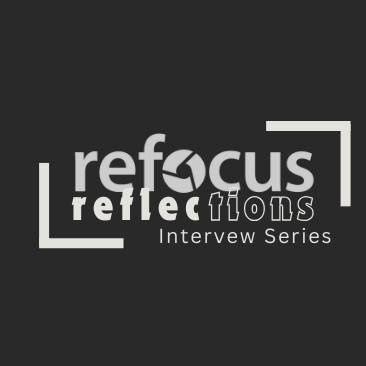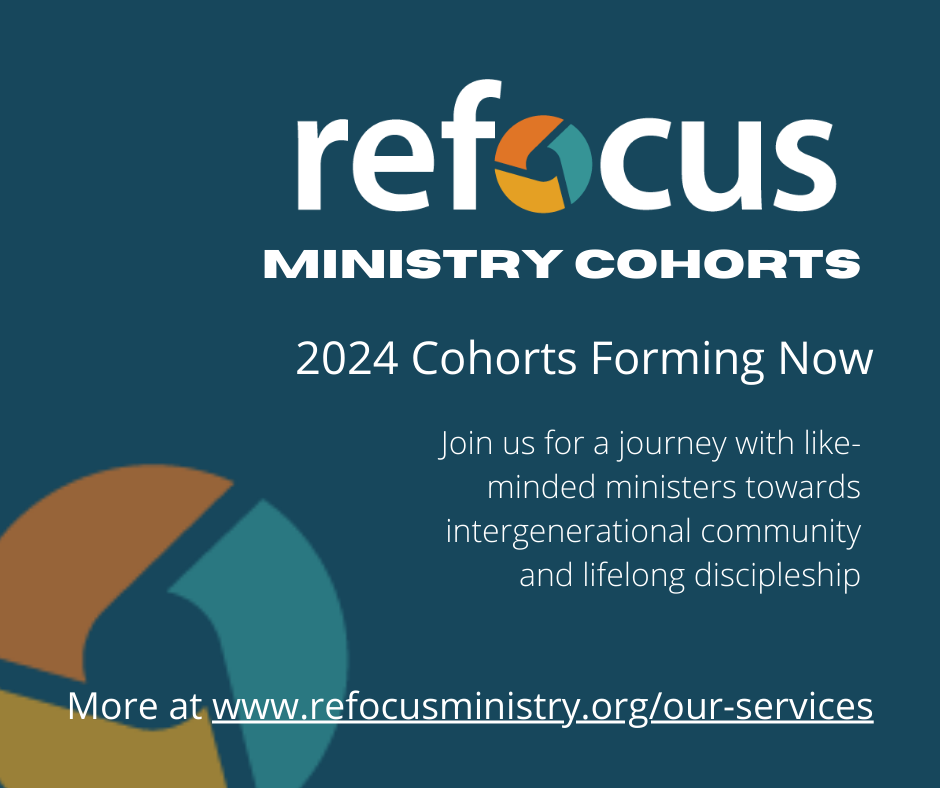A frequently asked question at ReFocus is “What does this actually look like in churches?” “This” being an age-integration church where generations have the opportunity to connect with one another, build meaningful relationships, and foster a culture of a lifelong discipleship.
Age inclusiveness is not a one-size-fits-all approach nor is it a program or curriculum that can be implemented which can sometimes make it difficult to answer that question. Because it looks very different in different churches. And the tendency when describing what it “looks like” is to begin describing programs and practices that, while important, can’t fully reflect the culture that has developed over time.
Culture change is rarely a smooth or rapid process. Rather, it’s a consistent movement in a specific direction. It’s myriads of subtle shifts in language, action, interaction, and resource allocation that compound over time to create a new reality. In other words, it’s the little things you do that make a big difference when it comes to creating intergenerational community at church.
Part of the culture change comes in the form of language, the way you talk about your church. The last few blogs have been about exactly that – using words that reflect welcome and invitation for all ages and creating spaces that reflect the words we are using. I’d invite you to consider reading those for that context.

But the second step is action, actually doing the things we have stated we want to do – build a community of faith across generations. This is where the temptation to rely on programming and curriculum begins to creep in.
Hear me when I say that am not opposed to programming or curriculum aimed at bringing generations together; far from it – ReFocus offers our own curriculum to help families experience discipleship at church together.
The issue arises when we rely on these things to create culture rather than using them to support the culture we’ve already cultivated.
In our Connect Generations case study from 2022, one of the key findings we noted was that churches who were dependent on institutional constructs such as intergenerational curriculum, programming, and other church structures to bring generations together, rarely had success in translating those opportunities for connection into meaningful relationships. They could point to places where generations could be in a space together but they couldn’t demonstrate meaningful relationships being cultivated beyond those spaces.
An intergenerational culture is more than just having a bunch of different ages in a room together. An intergenerational culture cultivates a space where the room no longer matters because relationships are happening outside of the room, consistently throughout the week, and faith stories are being shared in multiple contexts outside of the regular service time.
That’s not to say there are not small, practical steps that we can take now to begin to nurture that type of intergenerational community. In fact, it is those little things can help provide a foundation on which those programs and structures we tend to gravitate towards can flourish.
The same case study mentioned above showed that churches who relied primarily on relational constructs (helping members to form intergenerational relationships through things like service projects, mission experiences, and prayer relationships) generally experienced a thicker intergenerationality in all areas, not just in the relational constructs. In other words, helping our faith communities grow together in relationships will lay the groundwork needed for introducing other programmatic structures that allow all ages to worship, learn, and serve together.
Where can we start?
We are generally a people of action. We need a thing to do in order to wrap our heads around the concepts we are embodying. Below is a list of “little things” that can help move a culture towards more connection.
Little things like…
- Learning and saying the names of the oldest and youngest members of your church. This can be especially poignant when these names are spoken in prayer in a fashion such as the Pray For Me campaign.
- Creating space for and encouraging the practice of sharing faith stories (testimonies) in the communal gathering.
- Shifting monies in the budget towards more “together” opportunities rather than age-segregated programming. When we put our money where our mouth is, we send a very public message that this thing is important to us and therefore, important to our community.
- Consistently bringing up the importance of “welcoming all-ages” as a core value of the church in both verbal and written communication.
- Posting signage that not only directs people to age-specific areas but also to common gathering areas.
- Equipping common areas with furniture, bulletin boards or message centers, and interactive stations that incorporate all ages into that space. Be creative!! View your common spaces not simply as a pass-through location (lobby) or an extracurricular activity space (gym/family life center) but as a place where people intentionally gather to build relationships and equip the space for that work!
- Incorporating all-ages into decision-making and stage presence on a regular basis (not only on special occasions).
Over time, these little things, once they become the normative and regular practice of the community, will create a big change and ready the space for more times of learning and worshiping as the body of Christ, together. Then when you introduce an all-age bible study or a prayground in the worship space or intergenerational small groups or age-integrated worship, the foundation has been laid and the culture has already shifted towards one of being together rather than living life apart.
“So, you never answered the question, what does it look like? “
Over the next few weeks, we will be sharing the stories of some churches who have worked to create a culture of inclusivity for all ages and how it “looks” at their church.
Remember, the answer to the question of including generations isn’t a copy-paste scenario.
We share these stories not necessarily because we think you should do what they did but because they can help us dream big for our own community. So stay tuned as we share the faith stories of some congregations who did the work, shifted the culture, and are living more intergenerationally than ever.
ReFocus Reflections Interview Series!

Last month, we let you know that we were getting ready to launch our new interview series, ReFocus Reflections, launching this fall alongside our brand-new Patreon account!
ReFocus Reflections features 30-minute interviews packed with practical tips, tricks, and resources on relevant topics for intergenerational ministry. Each episode brings you insights from esteemed guests including biblical scholars, practitioners, and ministers such as Kaitlyn Scheiss, Dr. Carmen Imes, Dr. Henry Zonio, and many more.
We are excited to invite you to sign up for our Patreon amount which gives you exclusive access to the full interview series as well as other incredible benefits.
We offer three tiers of membership, each with its own set of benefits:
- Basic Tier ($5/month): Access to all ReFocus resources, first dibs on free resources, roundtables, scholarships, cohorts, and webinars, plus access to the ReFocus Reflections Interview Series.
- Partner Tier ($7/month): Includes all Basic Tier benefits plus access to our Connect Generations Ministry Assessment Tool ($99 value – does not include follow-up coaching)
- Champion Tier ($10/month): Includes all benefits from the Basic and Partner Tiers plus an annual 60 Minute coaching session.
We are excited about all this new platform has to offer especially these phenomenal interviews with biblical scholars and ministry leaders.
Who do YOU want to hear from? Send your interview suggestions our way! Simply email christina@refocusministry.org with the name, contact info, and reason you think ReFocus followers need to hear from them!
Fall 2024 ReFocus Cohort Forming Now!

We are ready to put together our ReFocus Ministry Cohort for Fall 2024 and would love to have you be a part of this transformational experience!
*Who should join?* – ReFocus cohorts are appropriate for anyone serving in a ministerial context. The 12-week program includes weekly Zoom meetings, resources and materials for study, access to the Connect Generations Ministry assessment, and ongoing coaching for the participant and/or their church.
*Why should you join?* – If we keep doing what we’ve always done, we will always get what we’ve always got. If you are ready to think beyond the “church growth box” and move into the “make lifelong disciples” culture, this is the place for you. It’s not church as usual – it’s understanding the culture we are in, the practice of spiritual formation, and the formation of faith across generations rather than in siloed ministry areas.
*How to I join?* – Simply fill out the interest form linked here and we will reach out with more details and information on who to join this cohort!
About the Founder of ReFocus Ministry
Christina Embree is the founder and director of ReFocus Ministry. She holds a masters in ministry focused on Children, Youth, and Family Ministry and a doctorate in spiritual formation with a focus on age segregation and intergenerational ministry.
In addition to coaching churches of multiple denominations and traditions all around the globe, Christina serves as the Minister of Generational Discipleship for the Great Lakes Conference of the Brethren in Christ and as Next Gen pastor at Open Door Church in Lexington, Kentucky.
She is widely recognized as a speaker and author in the areas of generational discipleship, intergenerational ministry, and family ministry. As the mother of three children, she is familiar with the challenges of faith at home and pastoral ministry. She along with her husband Luke share a love for the church, their community, and the global work of peace and restoration through Jesus.
Interested in having Christina visit your church, speak at your conference, or coach your team?
Christina speaks on a wide range of topics related to children, youth, and family ministry with a unique focus on connecting generations for discipleship within your church. Her personalized approach allows you to pinpoint the needs of your community and gain the insight that you are looking for. Whether this is a volunteer team training and pastoral staff meeting or a ministerial conference, her experience and knowledge will help you determine the next step forward in creating lifelong disciples.
About the Founder of ReFocus Ministry
Christina Embree is the founder and director of ReFocus Ministry. She holds a masters in ministry focused on Children, Youth, and Family Ministry and a doctorate in spiritual formation with a focus on age segregation and intergenerational ministry.
In addition to coaching churches of multiple denominations and traditions all around the globe, Christina serves as the Minister of Generational Discipleship for the Great Lakes Conference of the Brethren in Christ and as Next Gen pastor at Open Door Church in Lexington, Kentucky.
She is widely recognized as a speaker and author in the areas of generational discipleship, intergenerational ministry, and family ministry. As the mother of three children, she is familiar with the challenges of faith at home and pastoral ministry. She along with her husband Luke share a love for the church, their community, and the global work of peace and restoration through Jesus.
Interested in having Christina visit your church, speak at your conference, or coach your team?
Christina speaks on a wide range of topics related to children, youth, and family ministry with a unique focus on connecting generations for discipleship within your church. Her personalized approach allows you to pinpoint the needs of your community and gain the insight that you are looking for. Whether this is a volunteer team training and pastoral staff meeting or a ministerial conference, her experience and knowledge will help you determine the next step forward in creating lifelong disciples.



